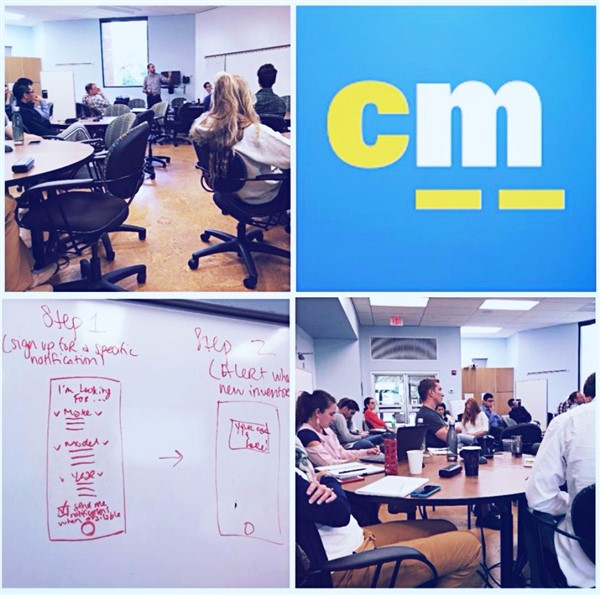When viewing the success and scale of huge corporations, it’s easy to forget that many of them can actually trace their origins back to a daring entrepreneurial vision for an overlooked or neglected market, much like the ventures that comprise this year’s cohort. CarMax is one such example of an unexpected idea made good – 25 years ago, it began as a disruptor to the used car buying process with the core idea that providing a superior customer service experience would set them apart. Now, the Fortune 500 Company boasts the title of largest used-car retailer in the United States, but internally it strives to stay true to its scrappy-outlook roots with small, tactical product teams and a continued emphasis on change and improvement.
This attitude and other core tenets of CarMax’s philosophies fall under a larger umbrella called lean – the focus of last week’s incredibly insightful and engaging workshop led by Darden/iLab alum Tom Giedgowd and his colleague Jake Mitchell. According to Giedgowd, lean is a mindset and set of behaviors that help de-risk your time and test your assumptions. Part of cultivating a lean mindset, the CarMax team told us, involves realizing that output does not equal outcomes – ultimately, customer experiences must exist at the intersection of valuable (solves a problem), feasible (able to be created), and usable. Imagine a swiss army knife with endless gadgets and gizmos – just because you decide to add more bells and whistles and spend time designing and crafting these accessories (output) doesn’t mean it will make the knife more useful for the user in the end (outcome).
To avoid that common pitfall, the CarMax team suggests that makers should very tightly pair product development with a relentless focus on business outcomes – ensuring they invite customer feedback at every step of the way. Giedgowd and Mitchell, themselves, have witnessed actual customers navigate through and interact with the CarMax website, and this process has led to several insights and subsequent developments that improve and enhance future customers’ experiences. The ways that CarMax invites customer feedback run the gamut from the sophisticated (a website popup they can turn on and off) to the rudimentary (purchase Starbucks gift cards and ask people on the street for a moment of their time), and the ventures began to see unexpected similarities to the ways they operate and the cheap but effective methods they often employ. Lean principles don’t require a level of success or scale in order to work – sometimes simple is best.
But, true to the get-your-hands-dirty spirit they proselytized, the CarMax team turned the tables and put us to work in order to more thoroughly illustrate their point. With a tight timeline and a lofty goal (again, the parallels to the entrepreneurial process abound), they tasked us with coming up with a new product, service or feature that would be a natural extension of CarMax’s brand and value proposition. After each table – populated by a random but endlessly-interesting mix of folks across the 22 ventures – excitedly buzzed for about 15 minutes, we each had to present an idea, along with a clear statement of its purpose/customer benefits and a (poorly-drawn, in my case) visual representation of the concept (see whiteboard sketch above to fully appreciate the depths to which my artistic skills clearly do not go). It was incredible to witness the breadth and depth of ideas that were created in such a short amount of time with very few resources other than the perspectives and creativity of one another. Essentially, we were lean, mean idea machines.
Another key piece of wisdom the team shared with us was that it’s best to get the sting of negative customer feedback as soon and as cheaply as possible – in other words, “don’t spend several months and tons of money” developing something before getting that “pain” of a negative response (or, perhaps worse, a shrug). To that end, we were able to experience customer feedback on our idea in real time, gaining a mix of affirmation, dissonance, and new, tangential insights we didn’t even know we were looking for.
Giedgowd’s visit showed the cohort that an entrepreneurial background and its accompanying out-of-the-box thinking can also be fruitfully applied in a more traditional, “corporate” setting. Just as CarMax values both the affirmative and the contradictory pieces of information they encounter, this opportunity allowed for the ventures to take best practices from a top-caliber company and lean into what is useful for their own entrepreneurial journey.
